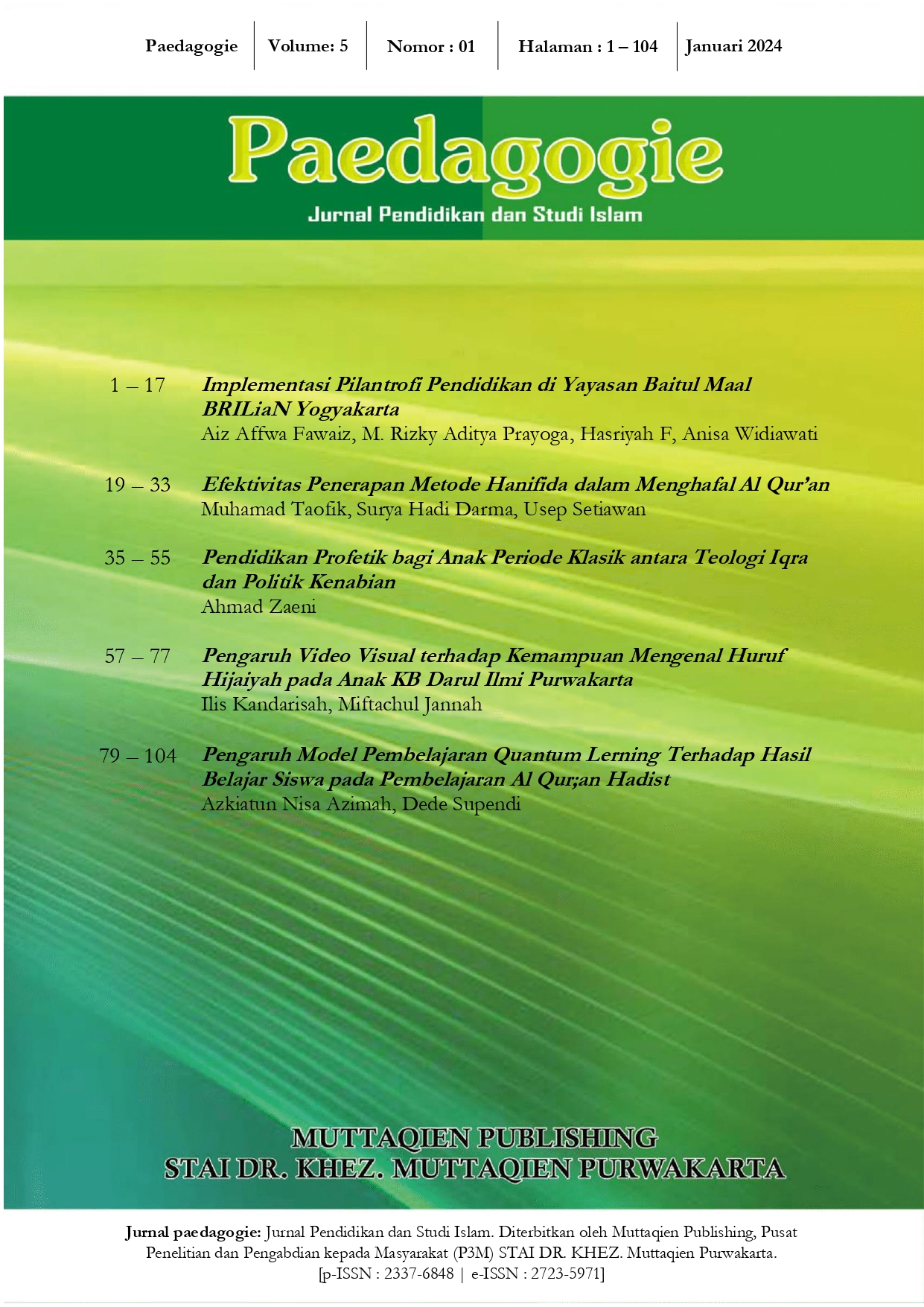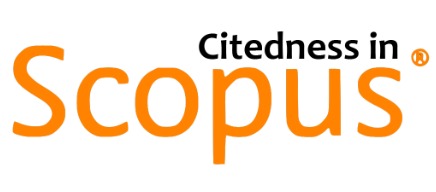Effectiveness of Applying the Hanifida Method in Memorizing the Qur'an
Keywords:
Metode Menghafal Al-Qur'an , HanifidaAbstract
The lack of motivation of students to memorize the Al-Quran is something that is often found in various institutions, especially in institutions that have tahfidz programs. The Hanifida method as a technique for memorizing the Qur'an is expected to be able to improve the ability of students to memorize the Qur'an at the Darul Hikam Dormitory of Al-Hikamussalafiyah Cipulus Islamic Boarding School. This research uses a descriptive qualitative approach and method using observation and interview techniques with types and sources of data accompanied by triangulation as data analysis to get the focus of the problem being studied. Hanifida is used as a technique in memorizing the Quran to improve students' ability to memorize the Quran. Memorizing the Quran using the Hanifida technique can strengthen memorization because it is unique by containing images, keywords, formulas and stories when compared to other methods such as the ATIK and Tarjim methods. so that it makes it easier for students to feel happy in the process of memorizing the Quran.
Â
References
Yusron Masduki, Implikasi Psikologis bagi penghafal Al-Qur’an, Medina-Te, No. 1 (18) 2018,
Yahya Abdul Fattah Az-Zawawi, Revolusi Menghafal Al-Qur’an, (Surakarta. Insan Kamil, 2010)
Moch. Ali Aziz, Mengenal Tuntas Al-Qur’an, (Surabaya. IMTIYAZ, 2012)
Herry Bahirul Amali, Agar Orang Sibuk Bisa Menghafal Al-Qur’an, (Yogyakarta. Pro-U Media, 2012)
Khoirotul Idawati, Hanifudin Mahadun, Teknik Menghafal Al-Qur’an Metode Hanifida, (Jombang. Kamila Ni’ami, 2019)
Rindiyani, R., Dharma, S. H., & Supendi, D. (2022). Pemberdayaan Remaja Masjid Dalam Meningkatkan Minat Mengaji Siswa Sekolah Dasar Desa Cipeundeuy. Jurnal INDONESIA RAYA (Pengabdian pada Masyarakat Bidang Sosial, Humaniora, Kesehatan, Ekonomi dan Umum), 3(1), 25-32.
Rohayati, S., Supendi, D., & Sanusi, M. (2022). Pengaruh Emotional Quotient (EQ) Terhadap Akhlak Siswa Kepada Guru Kelas X 2 di MA Daarul Ma'arif Pasawahan. Paedagogie: Jurnal Pendidikan dan studi Islam, 3(01), 25-34.
Sugiyono, Metode Penelitian Pendidikan, (Bandung. Alfabeta, 2013)
Sugiyono, Metode Penelitian, (Bandung. Alfabeta, 2017)
Supendi, D., & Bumi, A. R. (2023). Pendampingan Menghafal Al-Qur’an Dengan Menggunakan Metode Ummi Di Pengajian Qurrata A’yun. Dedicate: Journal Of Community Engagement In Education, 2(01), 1-12.
Supendi, D. (2021). Pengaruh Aktivitas Menghafal Al-Qur’an Terhadap Kecerdasaan Spiritual Peserta Didik Kelas X di MA Al-Huda Jatiluhur. Paedagogie: Jurnal Pendidikan dan studi Islam, 2(02), 77-93.
Hamzah, Metode Penelitian Kualitatif, (Malang. Literasi Nusantara Abadi, 2019)
Published
How to Cite
Issue
Section
Copyright (c) 2024 Muhammad Taufik, Surya Hadi Darma, Usep Setiawan

This work is licensed under a Creative Commons Attribution-ShareAlike 4.0 International License.
Copyright and Licensing Policy
Paedagogie: Jurnal Pendidikan dan Studi Islam allows authors to retain the copyright of their work and to retain publishing rights. By submitting and publishing with this journal, authors agree to the following terms:
-
Copyright remains with the author(s), and they grant the journal the right of first publication. The work is published under a Creative Commons Attribution-ShareAlike 4.0 International License (CC BY-SA 4.0), which permits use, distribution, and reproduction in any medium, provided the original work is properly cited and any derivative works are distributed under the same license.
-
Authors are allowed to enter into additional non-exclusive distribution agreements (e.g., posting to institutional repositories, publishing in books), with acknowledgment of the work's initial publication in this journal.
-
Authors are encouraged to disseminate their work online (e.g., in repositories or on personal websites) before and during the submission process to increase visibility and impact.
Paedagogie: Jurnal Pendidikan dan Studi Islam supports open access and affirms that libre access with a CC BY-SA license or its equivalent is the optimal approach for scholarly communication. We prioritize free and open dissemination while encouraging the reuse and adaptation of published content under fair and equitable terms.
You are free to:
- Share — copy and redistribute the material in any medium or format
- Adapt — remix, transform, and build upon the material for any purpose, even commercially.
- The licensor cannot revoke these freedoms as long as you follow the license terms.















